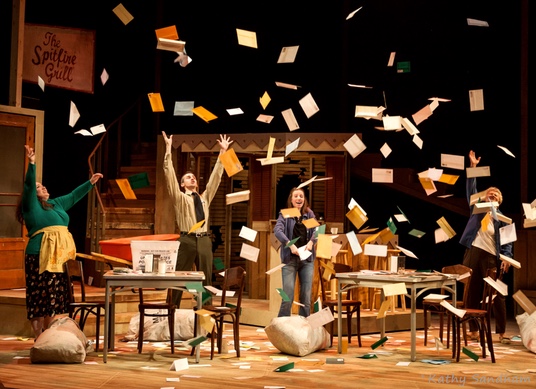Through Sun 10/18
Opening night of The Spitfire Grill was a special evening for the Beck Center for the Arts. It was the start of the organization’s 82nd season and Scott Spence’s 25th anniversary as artistic director.
The Spitfire Grill, with music and book by James Valcq and lyrics and book by Fred Alley and based on Lee David Zlotoff’s 1996 film of the same name, is a combination of myth and folktale, taking place in Gilead, Wisconsin.
As described in a travel book which convict Percy Talbott is reading at the start of the play, the rural town is filled with “autumn colors” and is located along the Copper Creek. Ignoring that it is February, and the leaves have long been off the trees, Percy, upon her release from prison, makes her way to Gilead, where the streets are deserted, many of the storefronts boarded up, and there is a single place to eat, the Spitfire Grill, which has been for sale for years with no buyers.
Percy reports to Joe Sutter, the handsome young local sheriff, who is to act as her parole officer. She needs a job. Old widow Hannah Ferguson has a bad hip and a caustic tongue and a secret to hide. She needs help in running the Spitfire, and, in spite of a conflicted beginning, Percy fits the bill.
As the story unfolds, we meet Effy Krayneck, the nosy, gossip-spreading postmistress; Caleb, Hannah’s nephew, who has lived his life in the shadow of Eli, Hannah’s “perfect” son who went off to the war with a hero’s parade but was “lost in action”; and Shelby, Caleb’s abused wife. A mysterious man, who is left a loaf of bread each night by the outside wood pile, turns out to be the pivotal character of the plot. Add a revealed murder, a raffle, the development of friendship, a budding relationship, the gaining of an appreciation for the simple things in life and a reunion, and you have the elements of the plot.
In contrast to the many loud, oversung and overamplified musicals, Valcq has created pleasant country, bluegrass and pop ballad sounds into a twangy Americana score, played by a keyboard, violin, cello and guitar. No loud guitar rifts, booming bass and pounding drums here. The lyrics, which are meant to be heard and which help develop the storyline and create clear characters, pick up the tone and meaning of the story.
Interestingly, none of the songs stand out on their own. No show stoppers, no big dance numbers, no top 10 hits. The tunes work, as does the script, to develop a simple, soul-searching tale with some of the same qualities of Our Town. It’s a tale which should make the viewer think of the values and purposes of life and what is really important. Even the humor is gentle.
Beck’s production, under the direction of William Roudebush, is well-conceived. Though the pace is a little languid at times, as the cast plays before audiences and hits a cadence that builds in laugh spaces and accommodates audience reactions, it should pick up.
The cast is uniformly excellent. Neely Gevaart creates a Percy who, while crusty on the outside, is tender underneath. Though a little difficult to understand at times due to flat articulation, her messages are well-developed. She has a fine voice and generally sings meanings rather than words. She did a nice rendition of “Shine.”
Kate Leigh Michalski takes on the character of Shelby with clarity and purpose. Her presentation of the beautiful ballad, “When Hope Goes” and the revealing “Wild Bird” are production highlights. Dan Folino is acting and vocalizing terrific as the frustrated and haunted Caleb. The conclusion of his “Digging Stone” was met with much deserved prolonged applause.
Lenne Snively balanced off the cantankerous nature of Hannah with a controlled underlying pain. Her “Forgotten Lullaby” was nicely done. No one plays gossipy overdone “very mature” woman better than Lissy Gulick. By her third entrance, each succeeding appearance was met with anticipatory laughter.
Shane Patrick O’Neill was excellent as Sheriff Joe Sutter, the hometown boy longing to get on the next train out of town, but held back by an unidentified need. He has a strong singing voice that was well displayed in “Forest for the Trees.” Derrick Winger created the right presence as the mysterious Visitor.
Music director Larry Goodpaster did a nice job of constraining the musicians so that they underscore the singers rather than overpowering them. This is extremely important due to the Mackey Main Stage’s very poor acoustics. Even so, though the cast wore microphones, some of the lyrics were lost.
Aaron Benson’s rustic wooden multi-level set created the correct mood, but due to a low hanging staircase, actors had to duck under the overhang causing awkward entrances and exits.
CAPSULE JUDGMENT: The Spitfire Grill is a nicely honed script, filled with excellent music. It gets a well-conceived, acted and sung production.
The Spitfire Grill is scheduled to run through Sun 10/18 at Beck Center for the Arts. For tickets and information call 216-521-2540 or go to beckcenter.org
Next up at Beck? Mothers and Sons, Terrence McNally’s Tony-nominated play in its regional premiere 10/9-11/15.
[Written by Roy Berko, member, American Theatre Critics Association, Cleveland Critics Circle]